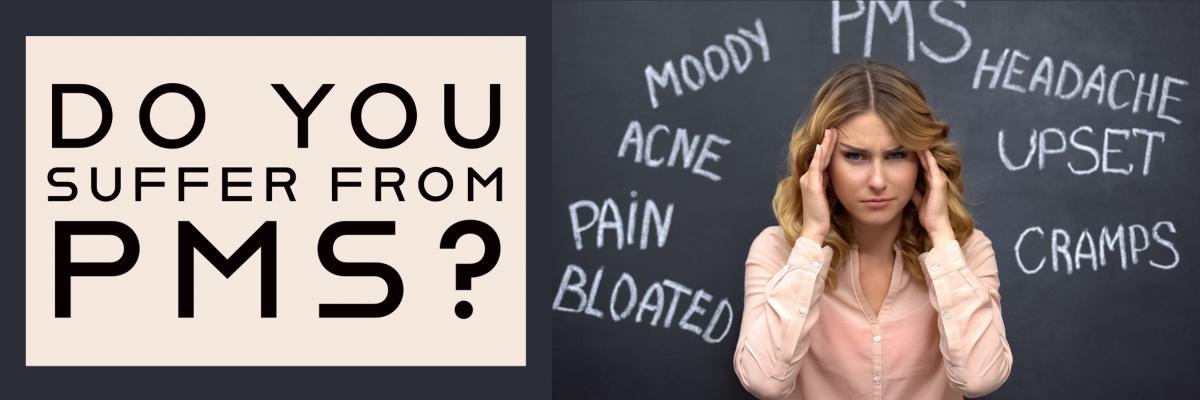
From puberty through menopause, women experience a monthly cycle that involves fluctuating hormones, times of fertility, and periods of menstrual flow. For some women these natural cycles go rather smoothly, but for about 75% of Western women there is some level of discomfort during their monthly cycle. These health disturbances, which include both physical and emotional symptoms, typically start about 7-10 days before the start of menstruation.
Although the symptoms vary from woman to woman, they typically include cramps, headaches, backache, bloating, edema, food cravings, irritability, moodiness, and/or depression. There may also be problems with constipation or diarrhea, reduced tolerance for light and noise, sleep disturbances, fatigue, anxiety, difficulty with concentration, and loss of interest in sex.
These symptoms have been lumped together under the term, premenstrual syndrome or PMS for short. About 5% of women experience symptoms so severe that they interfere with their ability to function normally. Medicine has coined a new term for these women, premenstrual dysphoric disorder (PMDD). Whatever you label the problem, however, modern medicine only offers symptomatic relieve for PMS or PMDD symptoms.
This does not mean that there are no solutions. There are. In many cultures, the majority of women do not experience PMS. This suggests that dietary and lifestyle factors common to most Western woman are causing this discomfort during the monthly cycle.
So, in this issue of Sunshine Sharing, we’ll explore the underlying causes of PMS and PMDD, and the dietary and lifestyle changes that can help to eliminate these problems. This includes nutritional supplements and herbs that can help to balance a woman’s cycle to both prevent and relieve common PMS and PMDD symptoms.
General Approaches for a Healthy Cycle
PMS symptoms do not have a singular cause, so there is no singular solution for everyone. However, there are two important approaches that will help most women. So, try them first before moving on to more specific remedies based on the general pattern of symptoms you experience.
Support Your Liver
PMS may involve an overburdened and toxic liver. The liver helps regulate hormone balance by breaking down excess hormones when they are no longer needed. The liver is also involved in replacing the blood lost through the period. Traditional aids for preventing PMS problems in other cultures have typically involved herbs that support liver function (alteratives or blood purifiers) and herbs that help build healthy blood (blood tonics).
A classic Chinese formula for this purpose is dong quai root, prepared rehmannia root, white peony root and ligusticum rhizome. There are many variations of this basic formula, but millions of Chinese women take these formulas throughout their childbearing years. As a result, most women in China do not experience PMS or PMDD.
Western herbalists have also used female tonic formulas for the same purpose. These formulas are used to balance the cycle, support general health in women, and reduce or eliminate PMS symptoms. Typical ingredients in Western formulas include red raspberry, blessed thistle, black cohosh, and chaste tree berries. A list of some of these Chinese and Western female tonic formulas can be found at the bottom of page 3.
Improve Your Diet
A poor diet congests the liver and creates toxicity that contributes to PMS. So, as with any other health problem, eating a healthier diet is important to solving the problem of PMS. Here are a few specific suggestions to consider.
First, avoid foods that contain xenoestrogens. Xenoestrogens are environmental chemicals that mimic the action of estrogen. They are a major problem in PMS Type A, which is the most common type, but they may be a factor in all PMS types. Sources of xenoestrogens include many pesticides and agricultural chemicals; hormones fed to animals that make their way into commercial eggs, dairy, and meat; chemicals from plastic containers (especially soft plastics); and some cosmetic products. Eating organic foods and avoiding plastic containers, especially with hot food, is a good place to start in avoiding these chemicals.
You can help to decongest your liver by avoiding refined and processed foods to reduce the chemical burden on your liver. In particular, avoid refined sugar, margarine, shortening, and hydrogenated vegetable oils. You can also eat foods that aid liver function such as berries and leafy green vegetables. Cruciferous vegetables like broccoli and cabbage are also helpful because they contain substances, like indole-3-carbinol, that aid the liver detoxification of excess hormones, including xenoestrogens.
Additional Resources
Every Woman’s Herbal by Dr. John R. Christopher and Cathy Gileadi
The Complete Woman’s Herbal by Anne McIntyre
Women’s Herbs, Women’s Health by Christopher Hobbs and Kathi Keville
Women’s Encyclopedia of Natural Medicine by Tori Hudson
Herbal Remedies for Women by Amanda McQuade Crawford
Herbal Healing for Women by Rosemary Gladstar
Strategies for Health by Steven Horne
Become a Member
Steven Horne's monthly member program is a way for you to get great information about herbs and natural healing to build your herbal business. Including the ability to share issues of Sunshine Sharing like this one. Click here to learn more.


